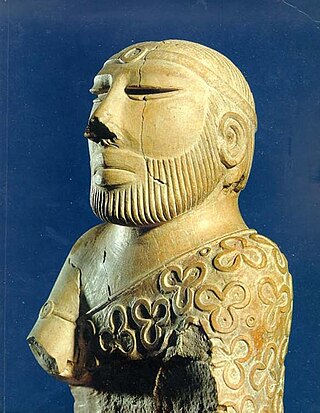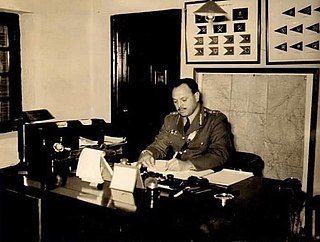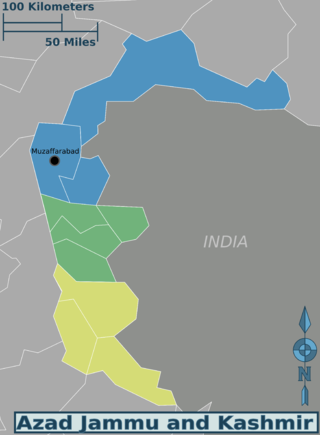
Muhammad Ayub Khan, widely known as Ayub Khan was a Pakistani army officer who served as the second president of Pakistan from 1958 to 1969. He previously served as the third Commander-in-Chief of the Pakistan Army from 1951 to 1958.

Liaquat Ali Khan was a Pakistani lawyer, politician and statesman who served as the first prime minister of Pakistan from 1947 until his assassination in 1951. He was one of the leading figures of the Pakistan Movement and is revered as Quaid-e-Millat.

Faiz Ahmad Faiz was a Pakistani poet and author of Punjabi and Urdu literature. Faiz was one of the most celebrated, popular, and influential Urdu writers of his time, and his works and ideas remain widely influential today in Pakistan and beyond. Outside of literature, he has been described as "a man of wide experience", having worked as a teacher, military officer, journalist, trade unionist, and broadcaster.
Major General Akbar Khan, DSO (1912–1993) was a decorated officer of the British Indian Army and later Pakistan Army. He commanded the Kashmiri rebels and Pashtun irregulars in the First Kashmir War under the pseudonym 'General Tariq'. In 1951, he was convicted of an attempted coup that came to be known as the Rawalpindi Conspiracy, and served a five-year prison sentence. Later he served as the Chief of National Security under prime minister Zulfikar Ali Bhutto. Under his guidance, the Army quelled the Baloch Insurgency during the early mid-1970s.

Rawalakot is the capital of Poonch district in Azad Kashmir, Pakistan. It is located in the Pir Panjal Range.
Said Akbar Babrak was an Afghan militant who assassinated the first Pakistani prime minister Liaquat Ali Khan in the city of Rawalpindi on 16 October 1951. Khan, who had become the country's prime minister immediately after the partition of India in 1947, was addressing a crowd of more than 100,000 people at Rawalpindi's Company Bagh when Babrak approached him and shot him twice in the chest; Khan later succumbed to his injuries at a local hospital. As Babrak was shot dead by police officers at the scene shortly after the shooting, his motives for the assassination remain unclear. An ethnic Pashtun, he had previously taken part in the Afghan tribal revolts of 1944–1947, fighting against the governments of both Afghanistan and British India.

Mian Iftikharuddin was a Pakistani politician, activist of the Indian National Congress, who later joined the All-India Muslim League and worked for the cause of Pakistan under the leadership of Muhammad Ali Jinnah.
Events from the year 1951 in Pakistan.
The Pakistan coup attempt of 1995 or Operation Khalifa was a secretive plot hatched by renegade military officers and against the government of Benazir Bhutto, the prime minister of Pakistan. The plotters aimed to overthrow the constitutional government and establish military rule in Pakistan. The plot was foiled after intelligence agencies tipped off the Pakistan Army. Despite the failure, the coup attempt would weaken Bhutto's government considerably in the aftermath.
Lieutenant General Ali Kuli Khan KhattakHI(M) is a retired Pakistani three-star rank general officer and former field commander of X Corps.
The political history of Pakistan is the narrative and analysis of political events, ideas, movements, and leaders of Pakistan. Pakistan gained independence from the United Kingdom on 14 August 1947, when the Presidencies and provinces of British India were divided by the United Kingdom, in a region which is commonly referred to as the Indian subcontinent. Since its independence, Pakistan has had a colorful yet turbulent political history at times, often characterized by martial law and inefficient leadership.

The Muslim League was the original successor of the All-India Muslim League that led the Pakistan Movement to achieve an independent nation. Five of the country's Prime Ministers have been affiliated with this party, namely Liaquat Ali Khan, Khwaja Nazimuddin, M. A. Bogra, Chaudhry Muhammad Ali, and I. I. Chundrigar. The Muslim League was defeated in the 1955 elections to the Constituent Assembly by a political alliance known as the United Front. However, Prime Minister C. M. Ali and Prime Minister Chundrigar were appointed to lead a minority government. The party was dissolved in 1958 after the declaration of Martial Law by General Muhammad Ayub Khan, the Commander-in-Chief of Pakistan Army.

Military coups in Pakistan began in 1958 when military officer Muhammad Ayub Khan overthrew and exiled president Iskandar Ali Mirza. Since its creation in 1947, Pakistan has spent several decades under military rule. After their respective terms in office, each of the past five prime ministers of Pakistan has faced convictions or imprisonment. This trend highlights a significant aspect of Pakistan's political landscape: the prevailing rule that the Pakistani military exercises influence wherever it deems necessary, often persisting despite potential repercussions. Throughout Pakistani history, the military has played a prominent role in governance, with periods where it has directly ruled the country.

The 1958 Pakistani military coup was the first military coup in Pakistan that took place on 27 October 1958. It resulted in the toppling of Iskandar Ali Mirza, the president of Pakistan, by Muhammad Ayub Khan, the commander-in-chief of the Pakistan Army.

Pakistan and the Soviet Union had complex and tense relations. During the Cold War (1947–1991), Pakistan was a part of Western Bloc of the First World and a close ally of the United States.

In spring 1947, an uprising against the Maharaja Hari Singh of Jammu and Kashmir broke out in the Poonch jagir, an area bordering the Rawalpindi district of West Punjab and the Hazara district of the North-West Frontier Province in the future Pakistan. It was driven by grievances such as high taxes, the Maharaja's neglect of World War veterans, and above all, Muslim nationalism with a desire to join Pakistan. The leader of the rebellion, Sardar Muhammad Ibrahim Khan, escaped to Lahore by the end of August 1947 and persuaded the Pakistani authorities to back the rebellion. In addition to the backing, Prime Minister Liaquat Ali Khan authorised an invasion of the state, by the ex-Indian National Army personnel in the south and a force led by Major Khurshid Anwar in the north. These invasions eventually led to the First Kashmir War fought between India and Pakistan, and the formation of Azad Kashmir provisional government. The Poonch jagir has since been divided across Azad Kashmir, administered by Pakistan and the state of Jammu and Kashmir, administered by India.
Nasim Jahan was a women's activist and a politician of the Pakistan Peoples Party. She was married to General Akbar Khan and played a key role, largely unknown, in the First Kashmir War. She was accused as a co-conspirator in the Rawalpindi Conspiracy Case but acquitted. Later she was became a founding member of the Pakistan Peoples Party and was elected to the National Assembly of Pakistan and contributed to the formulation of the Constitution of Pakistan.









